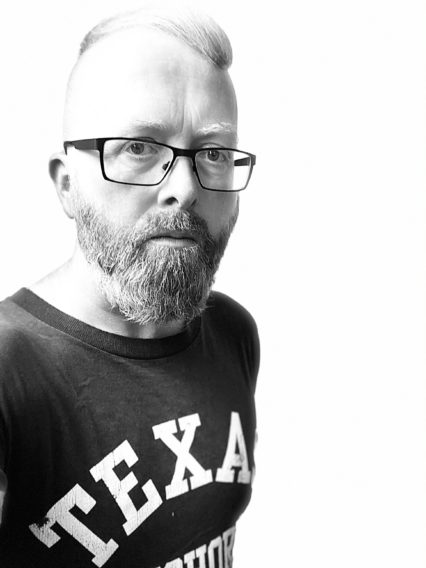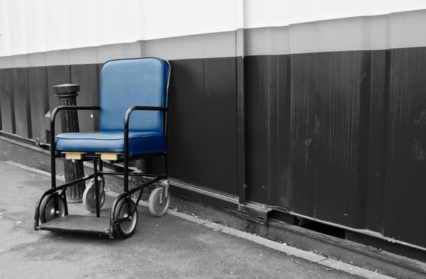Given the muted 25th anniversary of the Disability Discrimination Act 1995, playwright Greg Glover takes a journey through personal acceptance, institutional ignorance and the changing nature of inclusivity in the theatre industry.
My school playground was a brutal place, where any kind of difference was ruthlessly mocked by an ugly vocabulary lifted straight from society’s attitudes towards disability. The terror of being targeted meant that, when I suddenly lost a huge chunk of my hearing, I told no one. I quickly became adept at reading people’s faces, the slightest background noise rendering them mute.
But when you’ve said yes one too many times when you should’ve said no you have a major problem. That follows you into adulthood as you learn that you can only ask people to repeat something once, maybe twice before they get annoyed or rinse the situation for laughs. Of course, you have to laugh too because who wants to be that person that can’t take a joke even if that joke lasts all evening.

If you can’t always articulate what you want to say verbally you can always get it down on paper. So, I started to write, and immediately got some success as all this stuff came tumbling out of me and up onto the stage and the small screen.
But then I got ill, really ill, and nearly died and was left with a disability that was a nightmare to get to grips with as I was completely unprepared for how much the physical changes would crush me mentally.
Other writers may have been able to use the darkness, the anger, the self-doubt to create something amazingly insightful about the human condition and the journey they’d been on, but not me. I just wanted to ignore it. Pretend it wasn’t happening as the all-consuming fear of the school playground saw me taking calls in hospital beds, trying to sound all bright and breezy whilst doubled over in agony. Or I’d have meetings where the painkillers were so strong that I’d seem distracted or aloof, which meant that I got ghosted (way before that was ever really a thing).
Doing what I loved became really quite difficult and at times even impossible. And maybe if I’d have seen more stories like mine then maybe… who knows… but I didn’t, so I gradually withdrew. Wrote less. And what I did write was overwritten, overblown as I agonised over every single word. The toxic combination of physical pain, doubt and more doubt, and the fear of committing to something so financially unstable, when people with disabilities are already one of the most impoverished groups in society, meant that I just couldn’t see a way in.
I’d hear organisations talk about change and being inclusive but then when you looked at their diversity breakdown I knew why I kept quiet. Except for the one time that I didn’t and wished I had. Which made me think that if the gatekeepers didn’t really have any idea of our lived experience then how could they ever truly understand what was stopping people knocking on their doors?
And then, to my total shock, I won a prize, had a play put on, and came close to a couple of really big things before being chosen to be one of the BBC Welsh Voices. And for the first time in a long time I felt optimistic that things were moving in the right direction before Covid killed several projects stone dead.
As the country ground to a halt I stopped writing, unsure how to process this new obstacle when I started hearing the media ask what lessons could be learnt from those who faced restrictions and isolation in their everyday lives.
So what could quite easily have been a fleeting interest in those first few strange months of April and May seemed to be the beginning of something more as companies and organisations started addressing those with disabilities, creating opportunities, which meant my stop-start career started again. My voice was coming through ever more clearly on the page as I didn’t just euphemistically refer to my disability anymore or try to hide it. I started to accept it. And as the words flowed I was shortlisted for the BBC Wales Writer in Residence. And even though I didn’t win it, I received a judge’s commendation and appeared on the BBC Wales Arts Show, where I spoke about my disability and the need for those on the margins to make a noise.
Even if I do sometimes wonder about the motivation behind the sudden headlong rush to inclusivity after so much inertia, I’m just glad it’s happening. Because even though it was a missed opportunity that more wasn’t made of the 25th anniversary of the Disability Discrimination Act, it seems that the artistic landscape has so irrevocably changed that the conversations it could’ve sparked are starting anyway. People want perspectives that reflect the world they see around them. That is something I want to be a part of because. For too long I’ve been a spectator.
Greg Glover is an award-winning playwright who has had several short films shown on television. He was recently one of the BBC Welsh Voices and received a judge’s commendation from the Wales Writer in Residence award in December of 2020. Greg Glover











